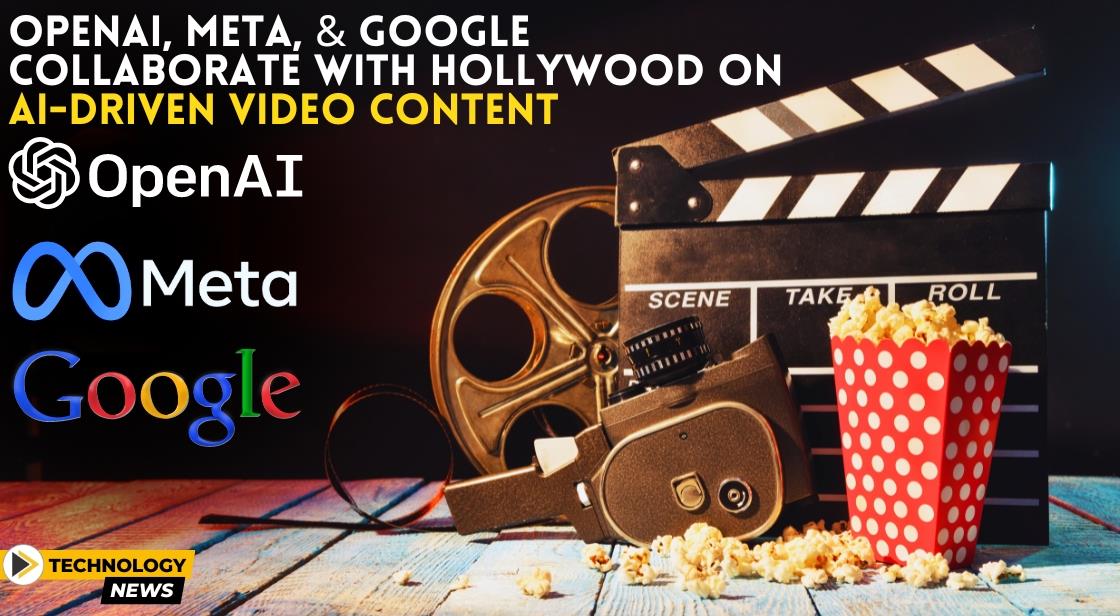OpenAI, Meta, and Google Collaborate with Hollywood on AI-Driven Video Content

News Synopsis
Tech giants OpenAI, Meta, and Google are partnering with Hollywood studios to integrate advanced AI video generation tools, aiming to revolutionize filmmaking with lifelike, text-prompt-based video creation technologies.
Tech Giants and Hollywood Studios: Collaborating for AI Video Generation
Meta and Google have recently engaged in discussions with major Hollywood studios to acquire licenses for their AI video generation platforms, according to a source.
These meetings come on the heels of similar discussions by OpenAI, which has also been exploring the potential integration of its AI video generation model, Sora, with Hollywood studios.
The Push for AI Video Innovation
Both Meta and Google are developing technology capable of creating lifelike scenes from text prompts. These companies have even offered significant financial incentives to collaborate with studios.
Microsoft-backed OpenAI is reportedly involved in similar discussions, highlighting the competitive race among these tech giants to dominate the AI video generation landscape.
AI in Current Hollywood Productions
Hollywood is already integrating artificial intelligence into filmmaking. For example, filmmaker Tyler Perry has used AI to alter makeup for his character Madea in movies. Additionally, director Robert Zemeckis has employed AI to de-age actor Tom Hanks for an upcoming film.
These examples underscore the growing influence of AI in the industry.
OpenAI's Sora: Early Leader in AI Video Generation
OpenAI launched its Sora AI text-to-video generation tool earlier this year. Sora can generate videos up to a minute long, maintaining high visual quality and fidelity to user prompts.
The model excels in creating complex scenes featuring multiple characters, specific motions, and detailed backgrounds. It understands both the explicit instructions in a prompt and the physical context of the described elements, ensuring realistic and imaginative video outputs.
Google's Veo: New Entrant with High Capabilities
Google recently announced its AI video generation tool, Veo, at the Google I/O event. According to Google, Veo is their most advanced video generation model to date, capable of producing high-quality, 1080p resolution videos that extend beyond a minute.
Veo supports a wide range of cinematic and visual styles, making video production more accessible and providing users with unprecedented creative control.
Veo captures the nuance and tone of prompts accurately, rendering intricate details within complex scenes. For instance, if given an input video and a command to add kayaks to an aerial shot of a coastline, Veo can seamlessly integrate this change.
It also supports masked editing, allowing users to make modifications to specific areas of a video based on text prompts and mask areas. Furthermore, Veo can generate videos from both text prompts and images.
Expanding Capabilities to Broader Platforms
Google plans to integrate some of Veo's features into YouTube Shorts and other products, broadening the accessibility of advanced AI video generation tools to a wider audience.
Meta's Emu: Building Momentum
Meta has been developing its AI video generation model, Emu, since last year. Although specific details about Emu's capabilities are less publicized, Meta's involvement in this space indicates a robust commitment to advancing AI video technology.
Conclusion: The Future of AI in Filmmaking
As AI continues to evolve, its role in filmmaking is set to expand dramatically. With tech giants like Meta, Google, and OpenAI leading the charge, the integration of AI in video production promises to revolutionize the creative process, offering new tools and possibilities to filmmakers and content creators worldwide.
You May Like









